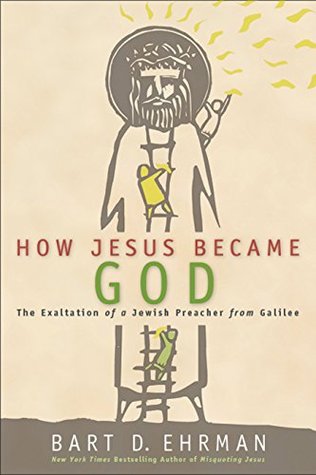More on this book
Community
Kindle Notes & Highlights
Read between
November 7 - December 25, 2021
only two people known by name were also called “Son of God.” One was the Roman emperor—starting with Octavian, or Caesar Augustus—and the other was Jesus. This is probably not an accident. When Jesus came on the scene as a divine man, he and the emperor were in competition.
One of the mistakes that people make when thinking about the question of Jesus as God involves taking the view that eventually was widely held by the fourth Christian century—that a great chasm exists between the human and divine realms—and assuming that this view was in place during the early days of the Christian movement.
If Jesus predicted that the imminent apocalypse would arrive within his own generation, before his disciples had all died, what was one to think a generation later when in fact it had not arrived? One might conclude that Jesus was wrong. But if one wanted to stay true to him, one might change the message that he proclaimed so that he no longer spoke about the coming apocalypse. So it is no accident that our final canonical Gospel, John, written after that first generation, no longer has Jesus proclaim an apocalyptic message.
Jesus did not declare himself to be God. He believed and taught that he was the future king of the coming kingdom of God, the messiah of God yet to be revealed. This was the message he delivered to his disciples, and in the end, it was the message that got him crucified. It was only afterward, once the disciples believed that their crucified master had been raised from the dead, that they began to think that he must, in some sense, be God.
Jesus is best understood as an apocalyptic prophet who was anticipating that God was soon to intervene in human affairs to overthrow the forces of evil and set up a good kingdom here on earth. As we have seen, this view was not unique to Jesus but could be found in the teachings of other apocalyptically minded Jews of his day.
Belief in Jesus’s resurrection changed absolutely everything. Such a thing was not said of any of the other apocalyptic preachers of Jesus’s day, and the fact that it was said about Jesus made him unique. Without the belief in the resurrection, Jesus would have been a mere footnote in the annals of Jewish history. With the belief in the resurrection, we have the beginnings of the movement to promote Jesus to a superhuman plane. Belief in the resurrection is what eventually led his followers to claim that Jesus was God.
the common Roman practice was to allow the bodies of crucified people to decompose on the cross and be attacked by scavengers as part of the disincentive for crime. I have not run across any contrary indications in any ancient source. It is always possible that an exception was made, of course. But it must be remembered that the Christian storytellers who indicated that Jesus was an exception to the rule had an extremely compelling reason to do so. If Jesus had not been buried, his tomb could not be declared empty.
If the Romans followed their normal policies and customs, and if Pilate was the man whom all our sources indicate he was, then it is highly unlikely that Jesus was decently buried on the day of his execution in a tomb that anyone could later identify.
Scholars have long held that the view of Christ in the Gospel of John was a later development in the Christian tradition. It was not something that Jesus himself actually taught, and it is not something that can be found in the other Gospels. In John, Jesus is a preexistent divine being who is equal with God. The earliest Christians—Jesus’s disciples, for example—did not believe this.
in John’s Gospel we are not hearing two voices—the voice of Jesus and the voice of the narrator. We are hearing one voice. The author is speaking for himself and he is speaking for Jesus. These are not Jesus’s words; they are John’s words placed on Jesus’s lips.


